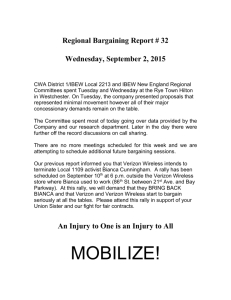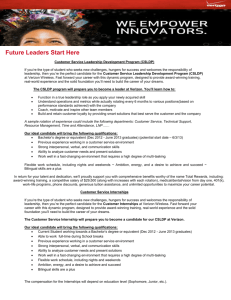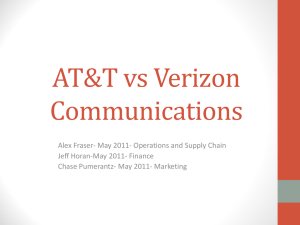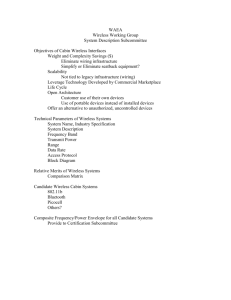94kb - Rural Wireless Association
advertisement
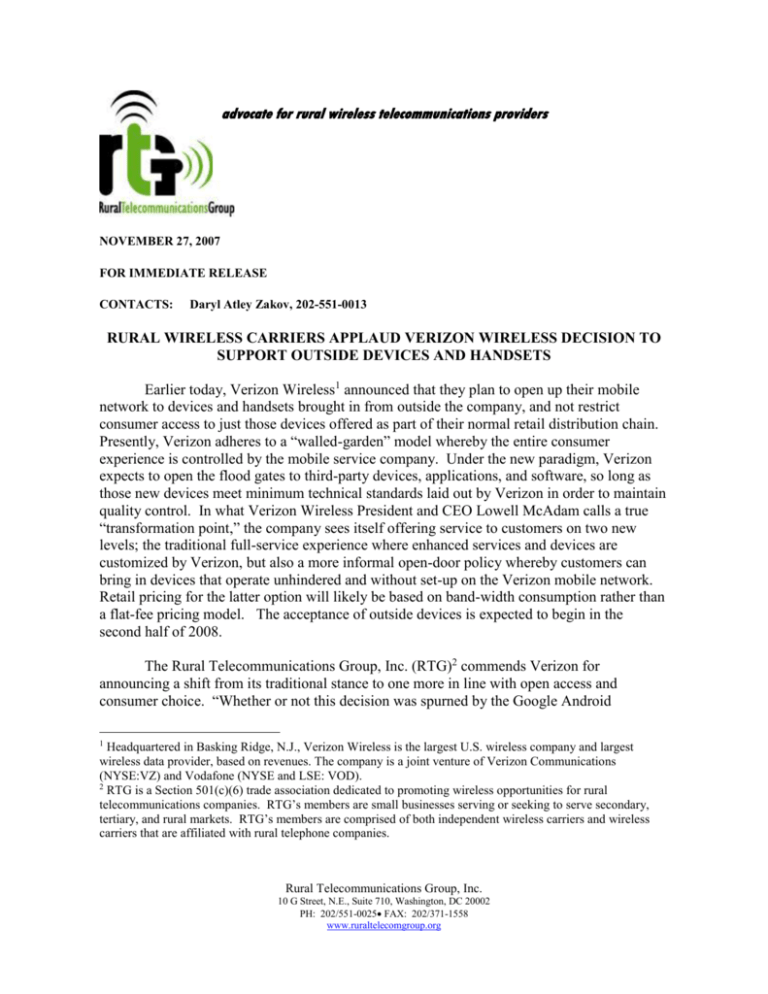
advocate for rural wireless telecommunications providers Washington, DC 20005 NOVEMBER 27, 2007 FOR IMMEDIATE RELEASE CONTACTS: Daryl Atley Zakov, 202-551-0013 RURAL WIRELESS CARRIERS APPLAUD VERIZON WIRELESS DECISION TO SUPPORT OUTSIDE DEVICES AND HANDSETS Earlier today, Verizon Wireless1 announced that they plan to open up their mobile network to devices and handsets brought in from outside the company, and not restrict consumer access to just those devices offered as part of their normal retail distribution chain. Presently, Verizon adheres to a “walled-garden” model whereby the entire consumer experience is controlled by the mobile service company. Under the new paradigm, Verizon expects to open the flood gates to third-party devices, applications, and software, so long as those new devices meet minimum technical standards laid out by Verizon in order to maintain quality control. In what Verizon Wireless President and CEO Lowell McAdam calls a true “transformation point,” the company sees itself offering service to customers on two new levels; the traditional full-service experience where enhanced services and devices are customized by Verizon, but also a more informal open-door policy whereby customers can bring in devices that operate unhindered and without set-up on the Verizon mobile network. Retail pricing for the latter option will likely be based on band-width consumption rather than a flat-fee pricing model. The acceptance of outside devices is expected to begin in the second half of 2008. The Rural Telecommunications Group, Inc. (RTG)2 commends Verizon for announcing a shift from its traditional stance to one more in line with open access and consumer choice. “Whether or not this decision was spurned by the Google Android 1 Headquartered in Basking Ridge, N.J., Verizon Wireless is the largest U.S. wireless company and largest wireless data provider, based on revenues. The company is a joint venture of Verizon Communications (NYSE:VZ) and Vodafone (NYSE and LSE: VOD). 2 RTG is a Section 501(c)(6) trade association dedicated to promoting wireless opportunities for rural telecommunications companies. RTG’s members are small businesses serving or seeking to serve secondary, tertiary, and rural markets. RTG’s members are comprised of both independent wireless carriers and wireless carriers that are affiliated with rural telephone companies. Rural Telecommunications Group, Inc. 10 G Street, N.E., Suite 710, Washington, DC 20002 PH: 202/551-0025 FAX: 202/371-1558 www.ruraltelecomgroup.org announcement, the bottom-line is that with this paradigm shift within Verizon, rural wireless customers will now have more choices in their future mobile experiences” says Jerry Wilke, Executive Director of RTG. Furthermore, this change within Verizon might push other large national wireless operators like T-Mobile USA, Sprint, Alltel and AT&T to re-examine their network access policies if they are seen as inhibiting consumer choice by sticking with current practices. There are a host of additional benefits resulting from this announcement, including an expected suppression of handset and device prices due to increased competition among manufacturers. Another long-term benefit could be the quicker adoption of LTE, or Long Term Evolution, as the default 4G standard in the United States. FCC Commissioner and Chairman Kevin J. Martin, in a released statement earlier today, agreed with the RTG when he said that “wireless customers should be able to use the wireless device of their choice and download whatever software they want onto it. I continue to believe that more openness—at the network, device, and application level—helps foster innovation and enhances consumers’ freedom and choice in purchasing wireless service.” RTG General Counsel Carri Bennet echoed Commissioner Martin’s statement and added “RTG has been a strong advocate for leveling the playing field where handsets are concerned. Rural consumers have been completely disadvantaged by handset locking and the inability of rural wireless carriers to gain access to popular handsets. It looks like the market place is taking hold and that consumers will be in a position to use wireless devices and applications where they choose, when they choose and most importantly how they choose.” -30U:\Docs2\RTG\Universal Service\RTG_USF_PRess_Release07.Nov20kj.doc Rural Telecommunications Group, Inc. 10 G Street, N.E., Suite 710, Washington, DC 20002 PH: 202/551-0025 FAX: 202/371-1558 www.ruraltelecomgroup.org
